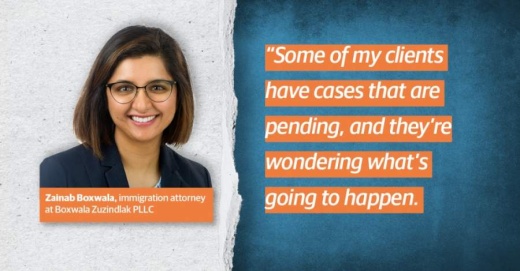“For a lot of the traditional things that the court does in-person—they shut those down,” said Alex Hunt, a family law and estate planning attorney with the Katy-area Hunt Law Firm PLLC.
Jury trials have been postponed, though Hunt said he has heard of some trials happening when all of the attorneys and parties agree to conduct a trial via Zoom.
Hunt said he is still attending family law hearings—sometimes with a judge, five or six attorneys and witnesses—via videoconference. Some child protective services, child custody cases and protective orders for domestic violence are continuing during the coronavirus pandemic, he said.
“The courts are starting to adapt their procedures and utilize technology so that the wheels of justice can continue moving, and when the stay at home order is lifted, there's not just a deluge of cases that they need to hear,” he said.
Business law attorney Michael Burg, who is the president of the Katy Bar Association, noted that most aspects of litigation have slowed.
“Though litigation is still there, people have slowed down the pace of litigation of sending out discovery requests,” he said. “Setting hearings for things are still happening, but they're happening at a lower level right now.”
Pending cases
Immigration lawyer Zainab Boxwala—a managing partner of Boxwala Zuzindlak PLLC, which has a practice in the Katy and services clients across the U.S.—said she, too, has experienced a slowdown in some aspects of her cases.

The closures and slowness have many of her clients worried, she said.
“Some of my clients have cases that are pending, and they’re wondering what’s going to happen,” she said. “They have relatives that are visiting on visitor visas, and travel has been suspended. They don't know what they should do.”
Burg said many of his business clients have put projects on hold, though some long-term deals are still being pursued. Meanwhile, Boxwala and Hunt said they are concerned about a backlog of cases.
“I think the concern is that the longer than this stay-at-home order goes, then the more and more pushed back everything's going to be,” he said. “Because if you push back the stuff from March to May, then stuff from May has to get pushed back to June or July. Boxwala added she is worried about paperwork being lost when offices reopen.
“You can expect a certain amount of backlog and confusion as a lot of processes are on hold,” she said.
Many young lawyers are struggling financially due to the court closures and slowdown of cases, Burg said.
"Their business has been cut off; some of our younger lawyers do criminal court appointments, and those have fallen off to nothing at this point," he said.
Maintaining litigation
Hunt said his firm has been trying to get as many divorce cases settled out of court as possible because it is a quicker and less expensive process for the parties.
But for divorce cases that cannot wait, local courts have made a procedural change, Hunt said. Before the coronavirus pandemic, clients had to go to court to get a judge to sign off on a final decree of divorce.
“What many of the courts are doing in Fort Bend County and Harris County is they're allowing the parties to sign off an affidavit, which is just a sworn statement, listing all of the same things that they would be saying in court,” Hunt said. “And then the judge can sign off on it in their chambers without needing to have a hearing.”

Hunt added his firm has received some COVID-19 specific litigation. For example, when the school districts closed their campuses immediately after spring break, some parents who had children with them temporarily for the break refused to return them to the primary custodial parents.
Hunt Law Firm has also had to work on situations in which one divorced parent is worried the other is not following proper social distancing and sanitizing guidelines while watching their children, he said.
“Some folks are concerned that then the kids are going to come back into their home, and if they have other kids in the home—like say they have stepchildren—then they and their stepchildren will get infected as well," Hunt said. "There's a lot of questions about what can you do in order to make sure the other parent is following the precautions and the recommendations."
Meanwhile, in immigration law, many aspects of immigration cases have been suspended, such as interviews or fingerprinting, Boxwala said. However, immigration offices are still accepting applications.
“[Filing] is the safest route right now,” she said. “If you have a visitor... and their visa is about to expire. The best advice is to file that extension.”
Immigration is already an area of the law that changes constantly—even before the coronavirus outbreak—Boxwala said. She added that seeking out an informed attorney can help individuals navigate the complexities and changes.
Burg said he did not advise businesses to pursue a lawsuit at this time if they can help it.

“If you're not in a cash-rich position, do not enter litigation right now, unless you are coming up against what we call a statute of limitation," Burg said, referring to the maximum time after an event within which legal proceedings may be initiated.
Virtual meetings
Hunt and Boxwala said they have been conducting client meetings virtually to abide by social distancing guidelines. But virtual meetings are not ideal for discussing private matters, especially in immigration detention centers, Boxwala said.
“How secure is [Skype or Zoom] when you’re talking about personal cases,” she said. “Some of these people are here because they're filing for asylum. They're afraid of going back to their home country, they may be afraid to tell you important aspects of their personal story.”

Even clients at their own home may also be afraid of discussing private details when so many others are stuck at home, too, Boxwala said. This is particularly hard for anyone in a domestic violence situation. Both Boxwala and Hunt stressed that there are resources available during the coronavirus to help anyone in such scenarios, such as hotlines and shelters.
Hunt said his law firm has been using videoconference to check in with colleagues to continue work on cases. He also is using videoconference and a mobile notary to conduct estate planning during the coronavirus, such as wills.
“Some folks think that estate planning is just stopped, but what we’ve done and what a lot of other innovative firms have done is adapted our procedures,” he said.





